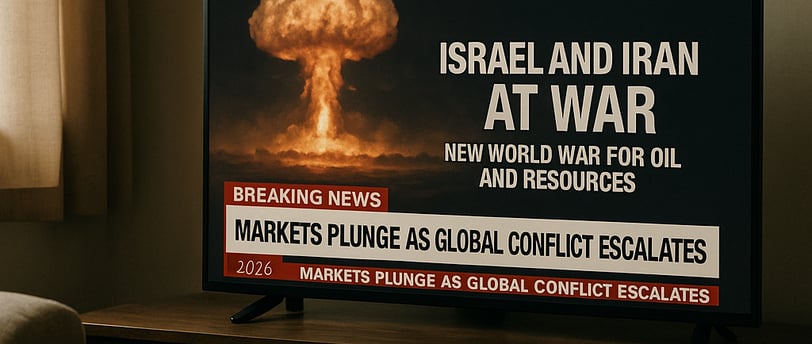Chapter Six: When the Lights Flickered
As tensions in the Middle East erupt into nuclear war, Keith watches in real time as the world fractures on live television. Markets collapse, oil fields burn, and the U.S. economy begins to spiral. In the stillness of his Pennsylvania home, with Willow by his side and seeds stacked in the back room, Keith realizes the collapse isn't coming—it's already begun. The grid is fragile, the air electric, and every choice now carries weight. This chapter marks the true turning point: the moment when the old world ends and survival begins.
THE TIN CAN AND THE TOMATO GARDEN
Keith Kalm
6/30/20253 min read


"Create next chapter as a realistic to modern day, and tell it as it's happening in real time, and stretch it out, as Keith watches the news about the Israel and Iran war that turns nuclear, and the new world war for oil and resources "
Chapter Six: When the Lights Flickered
The morning began like any other in Northeastern Pennsylvania—dew soaking the garden bed, a crow hopping across the street, Willow’s nose twitching at the scent of a groundhog’s path. Keith poured himself a cup of coffee, bitter and dark, and stepped barefoot onto the porch of the little house he’d made a home. The tomato plants were coming in thick this year—early, even. He squatted next to the tallest one, ran his fingers along the stalk, then stood up slowly, back aching from the long week in the kitchen.
Inside, the television was still on from the night before, muted. Something about the silence of it unsettled him this time. The CNN ticker was red—blood red—and fast. He unmuted.
“…unconfirmed reports of a second strike in the Iranian interior, just hours after Israel launched what it called a final defensive measure in retaliation. The United States has issued an emergency travel ban for all citizens in the Middle East…”
Keith sat slowly. The mug, warm against his palms, suddenly felt wrong. The room quieted beneath the weight of the words. A graphic filled the screen—satellite imagery showing an explosion, wide as a city. The anchor looked pale.
He reached for his phone, thumb trembling slightly, opened X.
#WW3 was trending.
#Nuclear.
#JerusalemGone.
He read in fragments, as if any full sentence might split him.
“Confirmed use of low-yield tactical…”
“Russia calls for immediate halt but also mobilizes fleets…”
“US in emergency session—martial law discussions underway…”
Keith blinked, blinked again, not sure what part of him was shaking more. Willow let out a low, uneasy groan, sensing it all.
He stood up too fast. The coffee sloshed. His mind reached for routine: check the garden, label some seed packs, finish the quote for the club’s new menu. But the screen wouldn’t let him go.
Then came the second wave.
The camera cut to oil fields in flames. Basra. Kirkuk. Kuwait. A new chyron:
“Attacks expand into economic targets—China and India signal energy protection response.”
It was all unraveling, like someone had pulled a single thread and the entire quilt of the world was falling apart.
Keith stepped outside again. He stared at the sky. It was a clear morning. Birds chirped. A breeze moved the maple leaves in the neighbor’s yard.
The normalcy of it made everything worse.
Inside, the news had shifted—gas prices spiking, cyber attacks on refineries, domestic energy rationing being “considered.” The word “rations” hadn’t been used seriously on air since his grandparents were alive.
He opened his laptop.
Logged into Love and Vegetables.
Looked at his seed stock, still stacked in bins in the back room.
Thirty-two varieties ready to ship.
Another hundred in bulk.
He suddenly knew:
This was it.
Not just the war. Not just oil. It was the end of how things were before.
He pulled up the camera feed from his garage, where his Vanagon, Bluebird, sat half-covered in a tarp. He hadn’t driven it in months. But it was gassed up. The battery was new. Tires still good.
He didn’t yet know if he would need to flee.
But something deep in his gut told him:
The grid wouldn’t hold.
And when it went, only those who had food, seeds, and somewhere to go would make it through the first wave of collapse.
The screen flashed again:
BREAKING—BRICS countries call for emergency economic coalition. Petro-yuan spikes 200%. Crypto markets in freefall. Dollar loses 17% overnight.
Keith looked at Willow. She was sitting, eyes locked on him, ears perked like she already knew.
He whispered, “It's happening.”
Then he began to pack.
Seeds first.
Water filter.
Solar charger.
And the small tin can from the top shelf of the pantry—
the one that had always been empty.
Until now.
